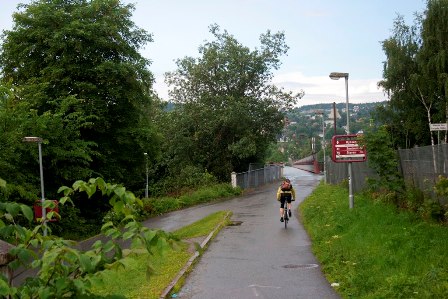Urban routes and commuting bicyclists’ aesthetic experiences
DOI:
https://doi.org/10.7577/formakademisk.777Emneord (Nøkkelord):
Bicycle commuting, aesthetic experience, urban design, bicycle routes, emotional well-beingSammendrag
This study examines whether and in what way aesthetic experience is involved in the perceived quality of bicyclists’ chosen routes between their home and work. It is important to distinguish aesthetic experience from experience that is related to the influence of instrumental features. The aesthetic impact is primarily connected to features that stimulate emotional well-being when cycling. An online survey was conducted in three Nordic cities, Odense, Trondheim and Reykjavík, concentrating on cycling in different urban surroundings. The interpretation of the meanings and values associated with certain features or characteristics that influenced the commuting cyclists’ aesthetic experience is based on three theoretical viewpoints: (1) the phenomenology of perception and experience, (2) urban design theory and (3) environmental aesthetic theories and methods. The last theoretical viewpoint involves the interpretation of experience of the environment into aesthetic meaning. The survey results indicate that aesthetic experience is valuable to most of the respondents and is therefore important in developing the quality of bicycle routes for commuting. Greenery, contact with the natural environment and distance from motorised traffic are the most important influences on a pleasurable aesthetic experience.

Nedlastinger
Publisert
Hvordan referere
Utgave
Seksjon
Lisens
- Forfatteren(e) beholder sin opphavs- og kopieringsrett til eget manuskript, men gir tidsskriftet varig rett til 1) å fremføre manuskriptet for offentligheten i den opprinnelig publiserte digitale form, og 2) å registreres og siteres som første publisering av manuskriptet.
- Forfatteren må selv forvalte sine økonomiske kopieringsrettigheter overfor eventuell tredjepart.
- Tidsskriftet gir ingen økonomisk eller annen kompensasjon for innsendte bidrag, medmindre det er gjort særskilt avtale om dette med forfatteren(e).
- Tidsskriftet plikter å arkivere manuskriptet (inklusive metadata) i den opprinnelig publiserte digitale form, i minst ett dertil egnet åpent tilgjengelig langtidsarkiv for digitalt materiell, som for eksempel i de norske universitetenes institusjonsarkiv innen rammen av NORA-samarbeidet.
Verket vil bli publisert OpenAccess med en Creative Commons 4.0-lisens som tillater alle å lese, dele og tilpasse innholdet, også kommersielt, under lisensvilkårene:
Dette verket må tilskrives/ krediteres på riktig måte, en lenke må gis til CC-BY 4.0-lisensen, og endringer som er gjort må angis på en rimelig måte, men ikke på noen måte som antyder at lisensgiveren støtter deg eller din bruk.



